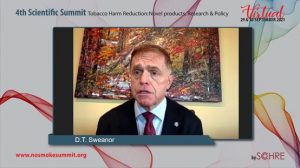The panel discussion on ethics and people’s rights started with Professor David T. Sweanor, J.D., stating that any issue of public health is a key issue, and when it comes to tobacco, the topic from a public health perspective has been quite confusing; therefore, this session aims at helping people address some of these problems.
Professor Lynn T. Kozlowski in his presentation on human rights and tobacco/nicotine harm reduction made the distinction between the right for a tobacco-free world and the right for a tobacco-smoke-free world. The foundation of human rights is being decent to other human beings, conforming to the standards of propriety and morality. The human rights to health-related information and a tobacco smoke-free world derive from the human right to health; the rights to health-related product information derive from respect to persons. There is no need to establish that there are nicotine-containing products that are much less harmful than tobacco cigarettes. The data that Prof. Kozlowski presented showed that smokeless tobacco is dramatically less dangerous than smoking cigarettes.
The tobacco or nicotine abstinence-only programmes can only be comparable to the abstinence-only programmes for the prevention of pregnancy and sexually transmitted diseases. Comprehensive programmes for sex education try to maximise abstinence and to reduce harm in the non-abstinent. According to studies, abstinence-only-until marriage programmes haven’t been effective in delaying initiation of sexual intercourse or changing sexual risk behaviours, whereas they threaten fundamental human rights to health, information and life; young people need to have access to accurate and comprehensive sexual health information. The studies concluded that abstinence can be a healthy choice, but adolescents should decide for themselves, and their choices should never be coerced. This perspective is not commonly found in tobacco control. According to the United Nations Convention on the Rights of the Child, governments should ensure access to adequate health-related information, involve adolescents in decision making relating to their health, and offer cessation assistance in order to protect children against tobacco.
Prof. Kozlowski stated that tobacco use is treated as minority, hence the rights of youth, young adults or older adults that are using these products run the risk of being neglected. He also presented a study on the accurate terms and evidence about how policy makers and consumers should prioritise human rights to being smoke-free over either tobacco- or nicotine-free, explaining that public health practice should prioritise attention to the deadliest products. As an epilogue, Professor Kozlowski showed the key facts of tobacco as presented at the website of WHO, where it is stated that “tobacco” kills up to half of its users, kills more than 8 million people each year, and more than 7 million of these deaths are the result of direct tobacco use; Professor Kozlowski stressed that the more accurate term would be “tobacco smoking” ―more accurate words and greater reliance on product related evidence is important when talking for human rights in health.
The second panellist, Mr. Charles A. Gardner, gave the consumers’ viewpoint on this topic, explaining that INNCO’s purpose with 35 member organisations worldwide is to support the rights of the 98 million adults who use safer nicotine products in order to avoid toxic forms of tobacco.
He referred to his experience when he was teaching, that two of the main ethics principles was beneficence and non-maleficence, which means do good and do no harm. The third one was autonomy, namely truth telling, informed consent and choice, the fourth justice, which means treating every one equally and the last one utility, aiming the greatest good for the greatest number. Tobacco control policies are often blind to the importance of autonomy. The general public and policy makers are profoundly misinformed on nicotine and of different nicotine products. The speaker stressed that the pattern of tobacco use to the high-income countries (like USA and UK) is very different from the pattern you find in low-and-middle-income countries.
Mr. Gardner then focused on the mental health issues, as some categories of people with neurodiversity issues smoke more than the general population; tobacco smokers are concentrated in specific communities, who are by definition vulnerable and already stigmatized, and because of the smoke they are doubly stigmatized. People use nicotine products, as nicotine alleviates stress and increases focus; however, nicotine has been demonised over time and there are many years of nicotine studies that have been neglected because the focus was on health benefits. The panellist emphasised the fact that there is no comparable review of all the science on nicotine products, the characteristics, the health benefits, and potential risks. Smoking has been now escalating in the most vulnerable communities, whereas access is denied to safer nicotine alternatives, raising tremendous human rights and social justice questions.
The third panellist, Dr. Stanimir Hasardzhiev, addressing the panel as a patients advocate, explained that things differ from country to country, so we cannot generalise. However, people have a common way of thinking, despite the different cultures and the different economic situation, and usually follow the trends of the society. In Bulgaria, people smoke a lot, and they enjoy it, the speaker said; one can even be discriminated if he/she does not smoke. Although they have introduced all restrictions and bans in Bulgaria, people continue smoking a lot.
Dr. Hasardzhiev added that we should also consider all those people with chronic diseases, since more scientific data are being introduced and we should work with these people differently, to understand why they smoke and why they do not want or cannot quit smoking. The new data show that there are other ways. Therefore, we pose the question: Do the smokers have the right to know what are the alternatives? It is really a major chance for these people to start controlling their lives by knowing what the new scientific findings are. As to how authorities address these issues, Dr. Hasardzhiev said that when he is talking with WHO officials, he tries to stress that these questions need to be addressed, since patients have these problems, and we cannot leave behind so many people who have tried to quit smoking and did not manage to do it. From his experience, however, many doctors have already started advising their patients to explore the different alternatives; he emphasised on the need for the medical community to start talking about these things.
Professor Sweanor, closing the panel discussion, stressed that it is really disturbing to deny rights to consumers and in many cases, people do not receive adequate information or even receive inaccurate information; therefore, we should not blame the people, people are to be held responsible only for the information given to them.


